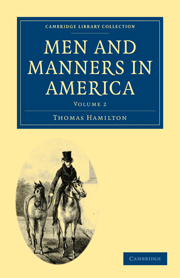CHAP. II - American Constitution
Published online by Cambridge University Press: 29 August 2010
Summary
In the observations I have already hazarded on the character of the federal government, it was my object simply to illustrate the fallacy of the leading and fundamental principles on which it is established. I would now willingly be permitted to direct the attention of the reader to those practical defects, arising from want of congruity and adaptation in its separate institutions, which have contributed materially to derange the whole action of the machine.
The colonies had no sooner achieved their independence, than they became desirous of establishing such an union between the different States, as might maintain tranquillity at home, and ensure unity in their relations to foreign powers. In 1787, a convention, over which Washington presided, was held in the city of Philadelphia. This convention consisted of delegates from all the States, with the exception of Rhode Island. After long deliberation, the plan of government, which forms the present federal constitution, was recommended and submitted for the separate consideration of the different States. In each of these a convention was assembled, and in 1789, the constitution, all the necessary formalities having been gone through, was duly organized and put in operation.
The legislative power conferred by this constitution is vested in Congress, which consists of two bodies—the House of Representatives and the Senate. The former of these is chosen biennially, in a proportion not exceeding one member for every thirty thousand inhabitants. The minimum only being specified, Congress possesses the power of extending the number of electors who are to enjoy the privilege of returning a member.
- Type
- Chapter
- Information
- Men and Manners in America , pp. 48 - 70Publisher: Cambridge University PressPrint publication year: 2009First published in: 1833

